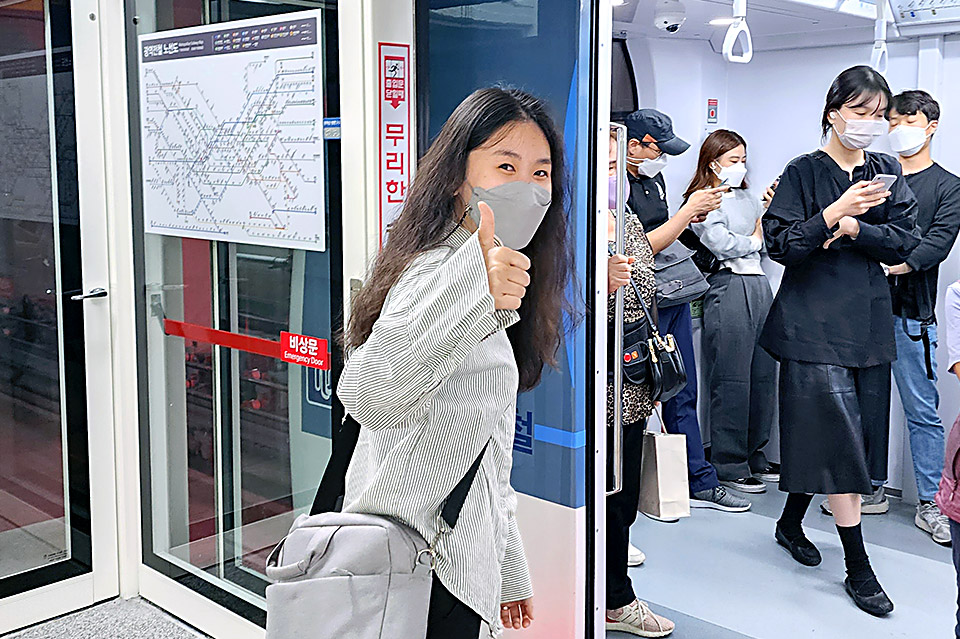ASEZ WAO’s Challenge of Using Public Transportation
Members from 13 countries used public transportation 1,635 times, of which the effect is equivalent to planting 2,236 pine trees.

ASEZ WAO, World Mission Society Church of God Young Adult Worker Volunteer Group conducted the “Challenge of Using Public Transportation” in order to reduce air pollutants and carbon emissions for three weeks between September 5 and September 23 in celebration of “International Day of Clean Air for blue skies” (September 7; hereinafter Day of Clean Air) and “Car Free Day” (September 22). “Day of Clean Air” is the first official UN day proposed by Korea and adopted by the UN in order to make known the importance of protecting the atmospheric environment and raising awareness and interest in climate change. “World Car-Free Day” was established with the goal of improving problems such as air pollution and noise pollution by reducing the use of cars.




According to a report of WHO Air Quality Database in April 2022, 99% of the world’s population breathes air that exceeds the pollution limit. And global warming caused by greenhouse gases has long been a global issue. Automobiles are one of the causes of air pollution and global warming; various harmful gases emitted from exhaust vents of automobiles cause air pollution. The amount of greenhouse gases emitted from automobiles is also significant, accounting for 12% (6 billion tonnes, CO₂eq) of the world’s greenhouse gas emissions (50 billion tons, CO₂eq) in one year.






The United Nations Environment Program [UNEP] has set the theme of this year’s Day of Clean Air as “The Air We Share.” For this, ASEZ WAO produced a music video of “Blue Skies,” in celebration of “Day of Clean Air” and uploaded it on YouTube to deliver the message that we can turn the gray sky into the blue sky if we work together. The appealing lyrics and the mellow rhythms raised the viewers’ awareness of the importance of protecting the environment. ASEZ WAO also carried out the “Challenge of Using Public Transportation” by making efforts to improve atmospheric environment and combat climate changes caused by global warming. Showing card news and videos to their family, friends, and coworkers, they enlightened them to how much they could reduce the emissions of carbon dioxide, which is a representative greenhouse gas, if they use public transportation instead of their own car once a week.






If one person uses public transportation instead of a car once a week, he can reduce carbon dioxide emissions by 469.4 ㎏ per year.1 This is equivalent to planting 71.1 thirty-year-old pine trees.2 Members from 13 countries such as Korea, U.S., U.K., Hungary, Dominican Republic, Colombia, Ecuador, Peru, Argentina, India, the Philippines, South Africa, and New Zealand participated in the challenge and used public transportation 1,635 times. In this way, ASEZ WAO reduced carbon dioxide emissions by 14,758.2 ㎏, which is equivalent to the effect of planting 2,236 trees.
1. Based on 37.4 ㎞, which is the average daily mileage of a passenger car in 2013 (Data from Korea Transportation Safety Authority, 2015)
2. One 30-year-old pine tree absorbs 6.6 ㎏ of carbon dioxide per year (Data from the National Institute of Forest Science, 2013)
Kim Do-hyeong, who participated in the challenge, shared his impressions, saying, “I feel like I’m getting healthier with a new lifestyle of using public transportation. I wish more people will take interest in using the public transportation instead of driving their private car especially in this age when climate disasters frequently occur.”




ASEZ WAO is carrying out various activities to reduce carbon dioxide emissions, which is the main cause of climate crisis. In June, ASEZ WAO was noted for holding the “Challenge of Riding a Bicycle” in celebration of “World Bicycle Day” (June 3). “World Bicycle Day” is established by the United Nations to protect the environment and promote the use of bicycles that are beneficial to health.
ASEZ WAO members from countries such as Korea, the United States, Mexico, Peru, Argentina, the Philippines, and Afghanistan actively participated in the challenge by using their own bicycles or shared bicycles operated by government offices or companies instead of cars when commuting or traveling. If you ride a bicycle once a week, you can reduce carbon dioxide emissions by 25.1 ㎏ per year.3 Baek Seung-jin, an ASEA member, said, “I’ve also learned that there are many advantages such as savings in transportation cost and the effect of exercising. I would like to help reduce air pollution by riding my bicycle more than once a week.”
3. On the assumption that one travels the distance of 2 ㎞ per use of bike
